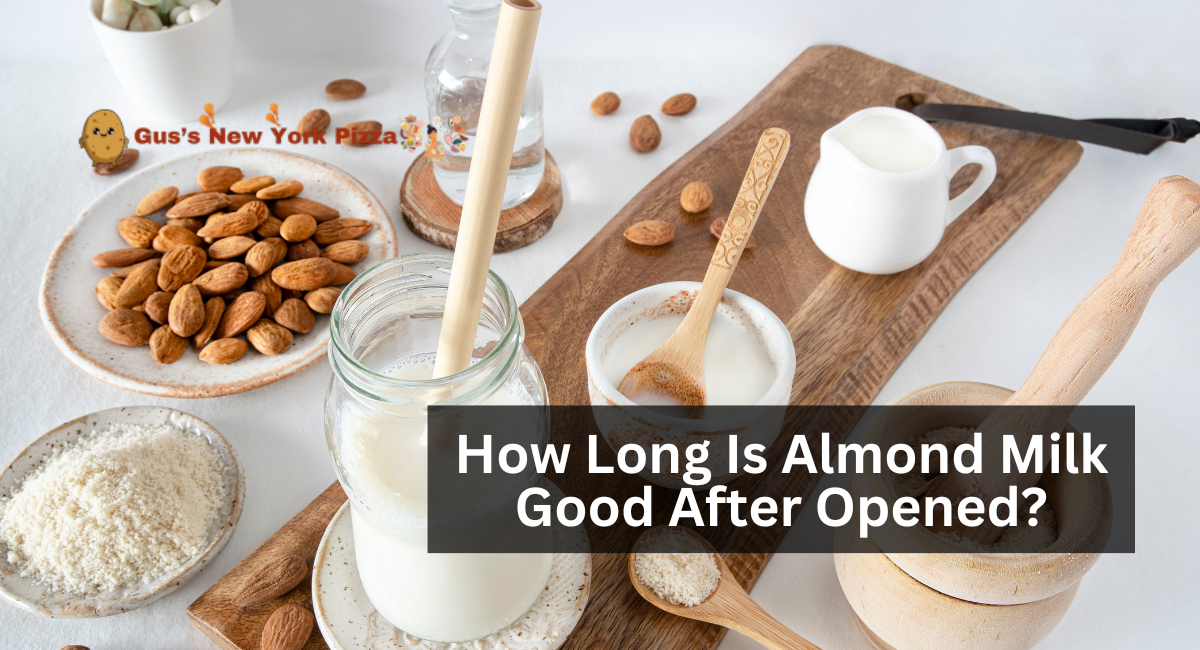Due to its many health benefits and adaptability, almond milk has become a popular substitute for traditional dairy milk. But if you’re a fan of almond milk, you’ve likely wondered: how long is almond milk viable after it’s been opened? In this article, we’ll discuss the shelf life of almond milk, how to store it appropriately, and other helpful hints to ensure that your almond milk remains fresh and safe to consume.
Understanding Almond Milk’s Shelf Life
Compared to cow’s milk, almond milk, and other plant-based milk options don’t last as long before they go bad. The shelf life of almond milk is contingent on several factors, including the variety of almond milk, the packaging, and the storage conditions.
Unopened Almond Milk
Unopened almond milk has a lengthy shelf life, typically several months beyond the expiration date inscribed on the packaging. To preserve its freshness, almond milk is typically pasteurized and vacuum-sealed. However, examining the expiration date before making a purchase is essential.
Opened Almond Milk
Almond milk has a substantially shorter shelf life once the carton has been opened. To optimize its freshness, it must be refrigerated without delay. Seven to ten days is the typical shelf life after opening for almond milk.
How Long Does Almond Milk Last?
Almond milk purchased from a store can be refrigerated for up to 10 days after opening. Almond milk that you make at home won’t last as long. A few hours of sitting will result in separation. Shake it; it will be as good as new, but I would consume homemade almond milk within three days.
How To Store Almond Milk To Keep It Fresh?
Almond milk should be stored similarly to how it is stored in stores.
Both store-bought (from the grocery store’s refrigerated section) and homemade almond milk should be refrigerated immediately after preparation. Until they are required, shelf-stable cartons may be stored in a pantry or cabinet. These must be refrigerated once they have been opened.
Maintaining consistent conditions when preserving almond milk is crucial, as improper storage can reduce its shelf life.
Try these straightforward storage tips to keep your almond milk as fresh as possible (while retaining all of its nutrients):
Keep it at the rear of the refrigerator. Do not store your cartons in the refrigerator door, as the temperature in this location fluctuates each time the door is opened and closed. Instead, place almond milk in the rear of your refrigerator, where temperatures are colder and more stable.
Unopened, shelf-stable cartons should be kept in a temperature-controlled area. Milk can be spoiled before opening it if exposed to excessive heat. Examine the packaging for recommended temperatures.
Maintain a secure seal on the carton. This will prohibit bacterial growth by excluding oxygen.
How To Tell If Almond Milk Has Gone Bad?
Even if it’s only been a few days (and not the recommended time for freshness), if you observe the following signs, it’s probably time to discard the almond milk:
The carton is swollen with air. Does the unopened carton appear somewhat distended and swollen? There’s a good possibility it’s spoiled.
Strange odor. Almond milk typically has a faint nutty odor, but it’s probably spoiled if you detect any unpleasant aromas or Eau de sour milk.
An unusual appearance. A simple spin can restore homemade almond milk to its original consistency when it begins to separate. But your almond milk has likely gone bad if you begin to observe lumps, strange textures, curdling, or a strange consistency that shaking cannot solve. Don’t keep it!
Mold is a genuine mold. Yes, mold may be developing in the milk container. Immediately discard the milk if you detect any fungus spots or spores. Observe small black specks in your milk. These may be bits of almond skin if the product is homegrown. Nevertheless, it is better not to take any chances and discard it.
Weird flavor. Depending on the sort and brand of almond milk you purchase, it may be sweetened or flavored. It is probably no longer good if you detect anything “off” (or even sour) when you take a sip.
Does Almond Milk Go Bad If Not Refrigerated?
Yes! Except for unopened, shelf-stable varieties, leaving almond milk on the counter, in the pantry, or elsewhere besides the refrigerator will hasten its deterioration.
This is because almond milk left out of the refrigerator for too long will attract bacteria, causing it to spoil and increasing the likelihood that you will become unwell.
Hence, how long is “too long”? According to the USDA, you should never leave perishable food at ambient temperature for more than two hours.
Tips
Without question! Here are some additional almond milk and shelf-life considerations:
- Check the Expiration Date: Before purchasing almond milk, always check the packaging for the expiration date. Choose products with a later expiration date to prolong their shelf life.
- Consider Purchasing Smaller Containers: If you consume almond milk infrequently, you should consider purchasing smaller containers to reduce waste. In this manner, you can always access a fresh container.
- Label and Date: If you decant almond milk into smaller containers for portion control, label them with the date of transfer to ensure that they are consumed within the allotted time frame.
- Utilize a Thermometer: To ensure your refrigerator is at the proper temperature (below 40°F or four °C), utilize a thermometer. Maintaining the correct food storage temperature is essential for food safety.
- Experiment with Flavors: Almond milk is available in various flavors, including chocolate, vanilla, and unsweetened. Experiment with various flavors to determine which one best suits your preferences.
- Repurpose Leftover Almond Milk: If you have a small quantity of almond milk close to its expiration date, use it in your morning coffee, tea, or cereal to avoid wasting it.
- Homemade Almond Milk: Consider creating your almond milk. Homemade almond milk may be fresher and devoid of preservatives, giving you greater control over its shelf life.
- Keep an Eye on the Carton: Even if the carton of almond milk has not been opened, it should be inspected for signs of injury or leaks. A damaged carton may compromise milk’s viability.
- Educate Yourself on Storage Labels: Some varieties of almond milk may include storage instructions on their labels. For the greatest results, always adhere to these guidelines.
- Consult Manufacturer’s Recommendations: If you have concerns about a specific brand of almond milk, visit the manufacturer’s website or contact their customer service for storage and utilization recommendations.
Remember that even though these strategies can help you maximize the shelf life of almond milk, food safety and quality must always take precedence. If you have any doubts about the safety or purity of your almond milk, you should err on the side of caution and discard it.
Thanks for visiting our site hope you like it ..










